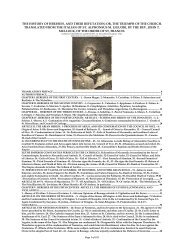The Writings of St. Francis of Assisi - + Saints' Works
The Writings of St. Francis of Assisi - + Saints' Works
The Writings of St. Francis of Assisi - + Saints' Works
You also want an ePaper? Increase the reach of your titles
YUMPU automatically turns print PDFs into web optimized ePapers that Google loves.
things throughout the ages. Amen.<br />
Chapter XXIV<br />
Conclusion<br />
THE WRITINGS OF ST. FRANCIS OF ASSISI<br />
In the Name <strong>of</strong> the Lord! I beg all the friars, that they in addition learn the tenor and<br />
sense <strong>of</strong> these things which have been written in this life 442 to save our soul and that they<br />
frequently recall these to memory. · And I entreat God, that He, who is Omnipotent, Triune and<br />
One, bless all those teaching, learning, having, remembering and putting these things into<br />
practice as <strong>of</strong>ten as they return to and do those things which have been written here for the<br />
salvation <strong>of</strong> our soul, · and I beseech all with a kiss on the foot, to love much, guard and<br />
remember these things. · And on the part <strong>of</strong> God Omnipotent and the lord Pope and through<br />
obedience I Friar <strong>Francis</strong> firmly precept 443 and enjoin, that concerning these things, which have<br />
been written in this life, no one diminish or add in writing anything to what is above (cf. Dt 4:2;<br />
12:32) nor are the friars to have another 444 rule. · Glory to the Father and to the Son and to the<br />
Holy Spirit, as it was in the beginning, and (is) now, and (shall be) always and unto the ages <strong>of</strong><br />
ages. Amen.<br />
<strong>The</strong> Rule given for those in hermitages<br />
[RegEr]<br />
<strong>St</strong>. <strong>Francis</strong> composed this brief regulation for the governance <strong>of</strong> the life <strong>of</strong> the friars who visited and/or<br />
lived in hermitages. <strong>The</strong> eremitic life was one <strong>of</strong> the central pillars <strong>of</strong> the early <strong>Francis</strong>can Order. <strong>St</strong>.<br />
<strong>Francis</strong> himself is said to have spent 8 months every year in one hermitage or another. Indeed many <strong>of</strong><br />
the most important graces which Christ gave him were associated with hermitages (e.g. the grace <strong>of</strong> the<br />
pardon <strong>of</strong> all his sins, the stigmata, the writing <strong>of</strong> the Regula Bullata.) And so it is not surprising that many<br />
<strong>of</strong> the reforms <strong>of</strong> the <strong>Francis</strong>can order have also been closely associated with a return to the eremitic life.<br />
This reflects the predominance in the <strong>Francis</strong>can vocation <strong>of</strong> prayer over external activity (cf. Regula<br />
Bullata [RegB] Chapter V). This rule was written sometime between the winter <strong>of</strong> 1217-18 and Pentecost<br />
<strong>of</strong> 1221 A.D.. 445<br />
Let those friars, who wish to stay religiously in hermitages, be three or as much as four;<br />
let two <strong>of</strong> these be the mothers 446 and let them have two sons or at least one. · Those two, who are<br />
mothers, let them observe the life <strong>of</strong> Martha and let the two sons observe the life <strong>of</strong> Mary (cf. Lk<br />
442 i.e. in this Rule; "life" is also used in this sense further on in this same paragraph.<br />
443 see fn. 7.<br />
444 Expecting the approval <strong>of</strong> this version <strong>of</strong> the Rule, <strong>St</strong>. <strong>Francis</strong> had added this stricture. On<br />
account <strong>of</strong> its rambling nature, which makes it unwieldy as a tool <strong>of</strong> government, this Rule was<br />
not approved by the Pope; however it does express faithfully the spirit and mind <strong>of</strong> <strong>St</strong>. <strong>Francis</strong><br />
concerning the Order, and has always been held in high regard among his sons.<br />
445 cf. K. Esser, p. 541.<br />
446 So called, because their duty is to attend to the domestic duties, the traditional role <strong>of</strong> mothers.<br />
Page - 101













